Duke PA Alumni Provide Health Care in Ukraine
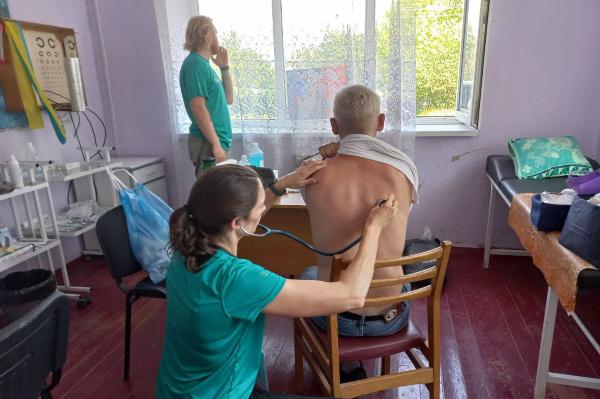
Physician Assistant (PA) Micaela Marker was looking for somewhere to donate her time when she saw an article in the Denver Post about a nonprofit organization called Global Care Force that was looking for volunteers for medical trips to Ukraine.
After an interview and a talk with her husband, she had a good feeling, so she packed her bags. Then, her Duke PA Program (DPAP) classmate, Nick Baker, saw her fundraising post on Facebook, and he signed up to be part of the same team as Marker. He said, "It was very comforting to have someone I trusted and had trained with at Duke while we were there."
Marker said she felt lucky to work alongside her classmate. "I was confident in his abilities as a clinician. I had some anxiety in the weeks leading up to our departure, but knowing someone on the team helped me have the confidence to go despite any fears," she said.
Because flights were restricted over Ukraine, Marker and Baker flew first into Poland, where they met the Global Care Force team coming from the United States. The group then took a 16-hour train ride to Kyiv, where they met the rest of the team they would work with for the next two weeks. Their team comprised of translators, a pharmacy team, drivers, and other health providers.
Global Care Force volunteers have seen over 4,700 patients in Ukraine since September 2022, the majority of whom have had no access or limited access to other medical care since the beginning of the war. They currently serve more than ten communities and set up clinics in any available space, such as churches, community centers, or schools. All services are free. During their weeks in Ukraine, the two Duke PA Program alumni said they faced challenging limitations in medical resources, but they saw a strong community spirit despite the displacement of residents. And they came away in awe of their Ukrainian team members.
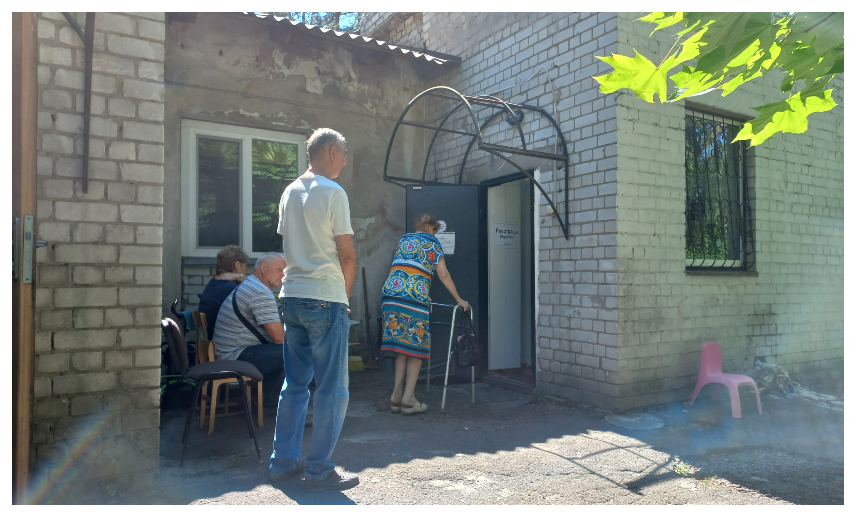
Continuity of care
Continuity of care is an integral component of any health care system, and the mass displacement of residents from Ukraine presents a unique challenge.
Additionally, many patients faced decisions between treating their health and fixing their homes in areas that faced missile strikes and other military action.
The Associated Press reports that Ukraine’s health care system has been a target since the beginning of the war. The resulting infrastructure issues, supply chain gaps, and personnel displacement have left the system unable to meet the medical needs of communities.
The Global Care Force team rotates through different areas of the country on a 30-to-60-day cycle to provide what continuity of care they can. Every time the clinic rotates back through a town, providers can access notes about patients who have previously visited the clinics. Though the formulary is limited, they try to give patients enough free medications to get them through until the next visit.
Hypertension is a common problem. Global Care Force representatives said almost every patient they treated in 2022 had extremely high blood pressure. But even this easily managed condition presented challenges. Baker said patients frequently believed “that you didn't need to take your blood pressure medications every day. You should just take them as needed.” Many patients were also taking older, short-acting blood pressure medications irregularly.
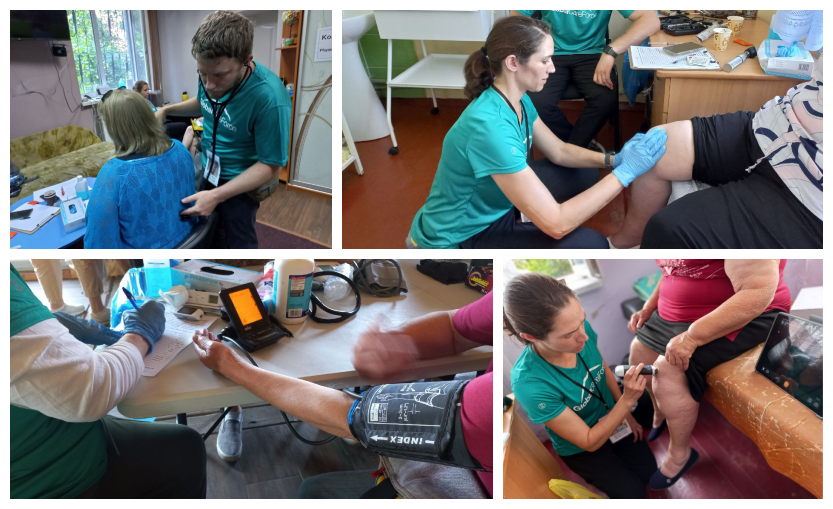
Baker said the limitations they faced were challenging. One patient had severe asthma, so he gave her what steroids and inhalers he could but worried about her ability to refill prescriptions. He knew she would likely have to conserve her supply.
They also saw a lot of depression and PTSD. Marker said she got the impression of a definite stigma about taking mental health medications. In addition, the team had a minimal variety of drugs to treat mental health, many of which can cause severe side effects if a patient stops taking them suddenly. This is a problem in a country where health care is inconsistently available.
Baker said some areas were recently underwater, and in others, sinks were ripped out of clinics.
Marker said that one clinic “had everything removed when the Russians retreated. They took all of the medications, tables, sinks, windows, etc., from the clinic."
Even in places that had not been bombed, it may be hours to the nearest pharmacy. “You can tell them, hey, you should go do this, but these people didn’t have anything,” Baker said.
The Global Care Force team focused on primary care, so they sometimes referred patients to specialists, though they knew many patients would be unable to follow up.
They did have access to a point-of-care ultrasound machine, but that was the only imaging directly available. When patients could see specialists and have labs drawn or imaging done, they could bring the results back the next time the clinic rotated through their area. Marker said this was another benefit of returning frequently to the same areas.
“If they were able to get those things done, you had some data to affirm your treatment plan,” she said.
Sometimes, the fact that people still need to live their lives presented a stark contrast to everyday reminders of war.
Baker said that sometimes, “you wouldn't know you were in an active war zone until the sirens went off or you walked past a building that was wrecked.”
Children playing on a playground could seem normal until one notices the bombed-out buildings surrounding the swings and slides. Marker said that sometimes it was difficult to process the fact that this damage is part of current events and not historical sites. She said she had to remind herself to connect the dots between destroyed villages and villages that were thriving just one year ago.
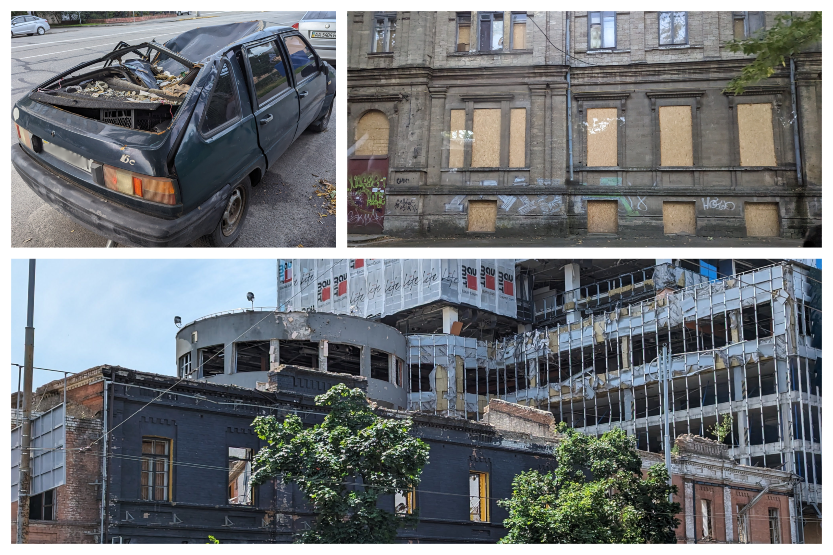
High Tension
Ultimately, they both said they never felt acutely unsafe.
One key piece of safety was being mobile as quickly as possible, so they carried their passports and documents everywhere they went. They had travel insurance that would cover their evacuation if needed.
For the most part, Baker said, it was “a tension-type thing rather than lots of high adrenaline.”
The local team members worked with the government in different territories to plan the safest route, avoiding areas with a higher risk of active fighting.
Most areas they visited had some power, water, and cell signal. Baker said many Ukrainian residents use apps to track incoming attacks and follow Telegram channels to get up-to-date information.
He said that the air raid sirens in the Mykolaiv area were the most disconcerting because that area was only 20 miles from the front lines and had been hit by missiles in the days prior.
Despite the mass displacement of residents, Marker said she still saw a strong community spirit.
She said that only one village they visited had its own doctor. The village was small and had recently suffered under Russian occupation. The doctor, who moved to Ukraine from Moscow when he married, volunteered with the Ukrainian army and had been on the front lines close to the village. When he tried to make his own appointment with the Global Care Force team, none were available. Marker said people from the village said, “No, we will give up our appointment before he doesn’t get seen.”
“Just having the opportunity to serve someone who was really giving back to his community so much was really impactful to me,” she said.
In one village, a fallen soldier was scheduled to come home, and they were told not to expect many patients, as the villagers planned to line the street to show their respect.
Marker and Baker expressed a special appreciation and awe for their Ukrainian team members.
The work is exhausting, but Marker said some of the Ukrainian team also work with other groups, such as Doctors Without Borders.
Baker’s translator was in physical therapy school and an active part of the health care team in addition to his role as a translator.
The team of Ukrainian people are just incredible. They are. They've done this almost every single month, since Global Care Force started,” Marker said.
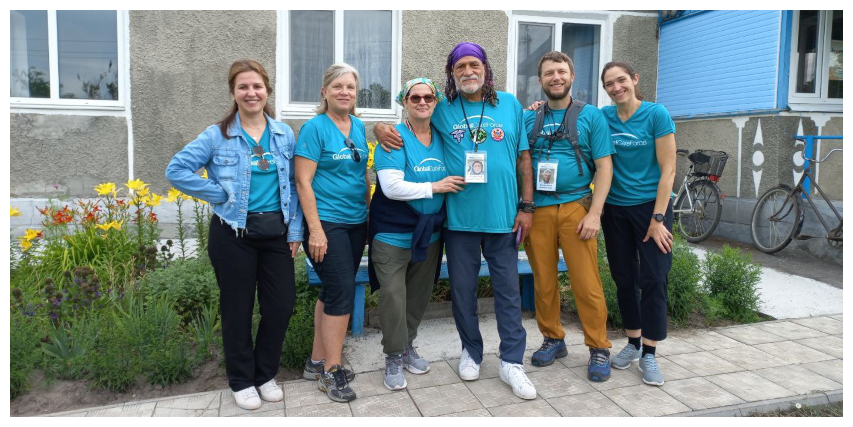
For information about Global Care Force, please visit their website.